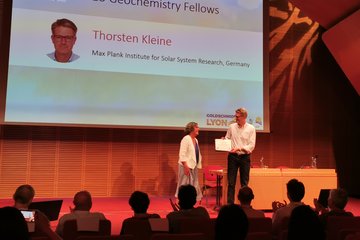Alle Typen
81.
Konferenzbeitrag
SK 1: A Possible Case of Triggered Star Formation in Perseus. In: Triggered Star Formation in a Turbulent Interstellar Medium (IAU S237) (Hg. Elmegreen, B.; Palous, J.). Cambridge University Press (2007)
82.
Konferenzbeitrag
Submillimetre Imaging of Deeply Embedded Outflow Sources and Class 0 Sources. In: Abstracts of Contributed Talks and Posters presented at the Annual Scientific Meeting of the Astronomische Gesellschaft at the Joint European and National Meeting JENAM 2001. (2001)
83.
Vortrag
Caracterizando las atmósferas de los planetas: espectros, procesos y estructura. BrainGain-PWF Venezuelan Physics School 2022, Online (2022)
84.
Vortrag
Atmospheric Characterization of (Exo)Planets: Spectra, Processes and Structure. Maynooth University, Department of Experimental Physics, Ireland, Online (2021)
85.
Vortrag
Júpiter y sus lunas heladas: lo que nos enseñará la misión espacial JUICE. Parque Explora y Planetario de Medellín, Colombia, Online (2021)
86.
Vortrag
Deciphering Jupiter’s atmospheric chemistry as a benchmark for extrasolar gas giants using Herschel/PACS. DFG SPP1992 virtual all-hands-on-deck meeting, Online (2021)
87.
Vortrag
Investigating physico-chemical mechanisms in (exo)planetary atmospheres and their impact on the observables. DFG SPP1992 virtual all-hands-on-deck meeting, Online (2021)
88.
Vortrag
Deciphering Jupiter’s atmospheric chemistry as a benchmark for extrasolar gas giants using Herschel/PACS. Virtual Annual Meeting of the German Astronomical Society, Online (2021)
89.
Vortrag
Characterization of Jupiter’s Atmosphere Using Far Infrared Spectra Measured with PACS Onboard the Herschel Space Observatory. Asia Oceania Geosciences Society 18th Annual Meeting (AOGS2021), Online (2021)
90.
Vortrag
Ground-based measurements of HCN abundances in the stratosphere of Titan: an inter-comparison with Herschel observations. Asia Oceania Geosciences Society 18th Annual Meeting (AOGS2021), Online (2021)
91.
Vortrag
Tracing the gas composition of Titan´s stratosphere from space, ground and airborne-based observatories. Workshop: "The Future of Airborne Infrared/Submm Astronomy: Prospects and Opportunities", online (2021)
92.
Vortrag
Characterisation of Jupiter´s atmosphere with Herschel/PACS. 2nd Teleconference for the Ariel Working Group “Synergies with Solar System Planets, Online (2021)
93.
Vortrag
Caracterizando las atmósferas de planetas desde la Tierra y el espacio. Peruvian Association of Astrobiology, Online (2021)
94.
Vortrag
Atmospheric characterisation of exoplanets through interpretation of their spectra. Online Seminar at Thüringer Landessternwarte , Tautenburg, Germany (2020)
95.
Vortrag
Retrieval of Jupiter’s atmospheric parameters using far infrared spectra measured with PACS onboard the Herschel Space Observatory. Europlanet Science Congress 2020, online (2020)
96.
Vortrag
Key physico-chemical mechanisms in (exo)planetary atmospheres and their impacts on the observables. "Exploring the diversity of extrasolar planets", Virtual Annual Meeting of the German Astronomical Society (2020)
97.
Vortrag
Investigating physical and chemical mechanisms in planetary atmospheres and their impacts on the observables. Europlanet Science Congress 2020, online (2020)
98.
Vortrag
Observing atmospheric HCN on Titan from space and ground-based observatories: an inter-comparison study from Herschel, APEX and IRAM 30m telescopes. Europlanet Science Congress 2020, online (2020)
99.
Vortrag
Studying physics and chemistry in atmospheres of hot Jupiters from future ground-based and space facilities. Europlanet Science Congress 2020, online (2020)
100.
Vortrag
Discussion on Astronomy. Online Live outreach Talk, organized by the Sociedad Planetaria Albireo de Ciencias Espaciales (SPACE) (2020)











